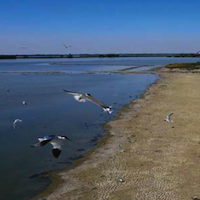Long term trends and breeding parameters of Gull-billed Tern Gelochelidon nilotica in three Italian coastal sites

All claims expressed in this article are solely those of the authors and do not necessarily represent those of their affiliated organizations, or those of the publisher, the editors and the reviewers. Any product that may be evaluated in this article or claim that may be made by its manufacturer is not guaranteed or endorsed by the publisher.
Authors
Between 2001 and 2018 colonies of Gull-billed Tern were monitored in large wetland complexes of Veneto (lagoon of Venice and the Northern Po Delta) and Sardinia (western and southern) regions. Most of the colonies settled in man-made structures such as islets, levees, dams, located inside fish farms, fish ponds and salt pans. Laying took place around half May until early June (Veneto), with eggs occurring in the nests until half July (Sardinia). Colonies had 3-230 pairs, with several instances of isolated pairs; colonies were mono- or plurispecific, with other Charadriiformes. The number of eggs per clutch was 2.6±0.6 (N=111, 1 SD) in the Venice lagoon, 2.6±0.6 (N=182) in the Po delta, 2.3±0.70 (N=1007) in Sardinia; hatched eggs were 2.2±0.6 (N=111), 2.0±0.7 (N=182) and 1.7±0.67 (N=40) per nest, respectively. The most important cause of breeding failure was due to flooding of nesting sites, due to the rapid increase of water levels inside fish farms and salt pans. During the 2001-2018 years, the Gull-billed Tern nested regularly in Sardinia, whereas in the Po Delta the first nesting occurred in 2001 and in the lagoon of Venice in 2008. The whole population ranged between 34 and 417 pairs until 2017 (223.6±113.4, N=17), with a sudden increase up to almost 1,000 pairs in 2018; the overall trend is of strong increase (p<0.01), with an annual rate of 10.5%.







